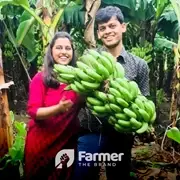
Our schedule in America was filing an unhealthy lifestyle, that is when we decided to turn the things around says Brinda and Vivek Shah of Brindavan. Life is now exciting says Vivek. Each day is a memory and each memory is a treasure of tales to be told the world over. We are in conversation with the Couple who quit their Life in Silicon Valley for creating a food forest in a village in Gujarat. Vivek presented his brand in FTB, a Krishijagran Initiative. Brinda is a Bachelors in Fine Arts and specialized in Painting and Masters in Printmaking. Vivek studied Interaction Design from California College of Arts. Both of them studied Permaculture and Sustainable living from Aprovecho.net which is situated in Cottage Grove, Oregon.

Growing food is an important skill set to possess. Especially in this era where we know that climate change is going to have a vast impact on our food security, reiterates Brinda. We are already experiencing changing seasonal patterns, so farming is really being at the forefront and addressing these changes. Natural agriculture has the ability to help us create resilient, local food systems. The second reason is nostalgia. Most of our favorite foods like mangoes, bananas, guavas, papayas, etc have become tasteless and they are heavily laden with agrochemicals. So in essence we are working for the security of our favorite foods says the awesome Shah Couple.

Their farm is located on the outskirts of Nadiad, Gujarat, India, and they have about 10-11 acres all under natural management. It is a mix of the commercial and experimental farm. Commercially they grow bananas, wheat, potatoes, pearl millet (bajra), fenugreek seeds, rajgira, moringa, guava, cassava, noni, and other seasonal vegetables. They have planted mangoes as well, which is started fruiting this year. On the experimental side, we try out various techniques such as plug nurseries, no-till vegetable farming to see how those can be integrated into the farm.


They strongly believe that observation is the foundation of agriculture practice. Out in the fields, over time, one develops a sort of intuition for sensing microclimate, pest pressure, changes in soil, etc. Their primary tool for soil building is green manure, and they believe it is a more versatile tool in the long run over simply adding compost or manure. From the day the farm was purchased they focused on improving the soil fertility which took a year. They used techniques like green manuring and controlled grazing to harvesting rainwater through pits and trenches. They process all the waste in their farm.

They also try to use natural methods for pest management techniques on the farm like growing aromatic plants such as Thai basil, tulsi, lemongrass, marigold, etc. on the outer boundaries of the field and for vegetable beds corners. They help to create a protective boundary from pests and keep the fruit flies and pests at the bay. Windbreaks, bird-loving plants, butterfly, and bee loving plants all are planted so that they are directed towards pest and soil management in some way or other. Another method to control pest which they do is to intercrop or multi-crop which is a process of growing two or more crops on the same area of the land.


Brindavan is divided into seven different subplots every plot is treated differently to revive and promote the growth of the crops. A small portion of their farm serves as a laboratory for experimenting with different production techniques, household wastewater management techniques. All the farm waste like leaves, cow manure even the weed are used to make compost so that not a single leaf is burned. Every drop of rainwater and biomass on-farm is harvested. They have dug trenches and pits on 10 percent of the overall land. These trenches were made as the first step of building the farm so that every drop of rainwater that Falls on the land can be captured. This ensures that every good monsoon cycle helps harvest five to ten lakh litres of water.


They do farming commercially but as a small scale farmer marketing of products are very difficult. They also continue to say that they are very much obsessed with the quality of their food when it leaves the farm so they are also involved in making several value added products at the farm like turmeric powder, jamun jam, banana chips etc. They also sell their raw produce directly to customers and their products like Bajra, wheat, seasonal vegetables, potatoes, lemon grass , vetiver roots, mulberry , jamun, methic seeds, rajgira, cassava, etc are so much in demand.

Before signing off the duo says the only intention was to create a model organic farm and now they hope their farm will serve as a model for ecological and economical sustainability in farming and divine inspiration.



















Share your comments